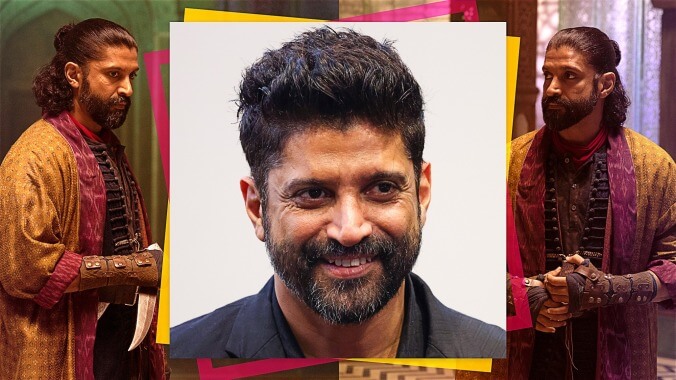Bollywood star Farhan Akhtar on making his Hollywood debut in Ms. Marvel
The powerhouse Indian actor and director reveals what attracted him to the MCU and whether audiences will see Waleed again

In the fourth episode of Disney+’s Ms. Marvel, which dropped this week, Kamala Khan (Iman Vellani) visits her homeland of Karachi, Pakistan, to seek answers from her grandmother about an ancestor’s superpowered bangle. While there, she’s surprised to get filled in on her origins by Waleed (Farhan Akhtar), the bearded, spectacularly dressed, and wise leader of the Red Daggers (a secret organization of fighters). He educates Kamala about, among other things, the Noor Dimension and the Clandestines. While it all involves a ton of exposition, Akhtar manages to infuse Waleed with an earnest personality as a renegade who cares.
Akhtar’s scene-stealing work in “Seeing Red” won’t come as a surprise to those familiar with his two decades in the Indian film industry. He’s a virtuoso who has helmed, starred in, and produced several Bollywood films since his 2001 directorial debut, Dil Chahta Hai. He pivoted to acting with 2008’s Rock On!!, about an indie-rock band, and has delivered some of India’s most-talked-about modern hits, from Zindagi Na Milegi Dobara to Bhaag Milkha Bhaag.
The A.V. Club spoke to Akhtar about being pitched a role in the MCU, what he wanted to achieve by playing Waleed, and his Bollywood recommendations.
The A.V. Club: You’ve had an impressive career as a director, actor, producer, and singer. So what compelled you to do Ms. Marvel?
Farhan Akhtar: As a film person, you’re always on the lookout for something exciting. Sometimes you manifest it and sometimes things just find you. This is just one of those things that found me, and I can’t express how grateful I am that it did. To start with, I’m a huge fan of the Marvel Cinematic Universe, from Iron Man to everything else that’s been made. When you’re watching something of this scale, this thought of, “Oh, I wish I could be part of something like it,” is always there. So when I got a call from my agent that “They’re looking for someone out of India and are hoping you’ll do this part,” I had to pinch myself. I had an incredible conversation with the producers and director. They told me about Ms. Marvel and what they’re hoping to get out of the show, which is about the first Pakistani American superhero of her kind. It’s steeped in culture from the subcontinent; it talks about what makes us who we are. It felt special and I just had to do it.
AVC: Even though we see Waleed for just one episode (that we know of), he still forms a strong bond with Kamala. What was it like to craft that dynamic in such a short period of time? And what did you want to get out of your performance?
FA: A lot of the work was done by the writers, [director] Sharmeen Obaid-Chinoy, and [executive producer] Sana Amanat. They had already created a huge backstory for Waleed by the time I came on board. It helped me understand the character a lot more with details like, when did he first cross paths with Aisha [Mehwish Hayat], when did he first see the bangle, and what is his own history? By the time I came to shoot, I had understood who Waleed is and what his purpose is in Kamala’s story. It really was important for him to be there for Kamala and therefore, for me as an actor, to be there for Iman. She is carrying this show and is doing an incredible job of it. She’s a naturally gifted actor. Apart from the knowledge Waleed has to impart to her, I was also focused on getting the audience to feel that Waleed does have affection for the girl and not just the bangle. He recognizes there’s something special in her.
AVC: The episode ends with a wide shot of Kamala pulled into the past in 1947 and witnessing the India-Pakistan Partition. How do you feel about a show like Ms. Marvel depicting this topic, which will obviously get a global audience?
